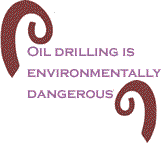
|
||||||||||||||||||||||
|
||
 |
||
Through much of the Bush-Cheney Administration, there was pressure from officials in the White House and elsewhere to drill for oil in the Arctic National Wildlife Refuge, a place awesome in its size and wildness.
For years, the pressure came from the right and from those politicians who feel they owe something to the oil companies and the other corporations that are involved in the exploration for oil, production of oil equipment, and the myriad other companies involved in the oil industry. A vigorous opposition to drilling in the refuge developed across the country over the past two decades and, so far, oil companies and their minions in power have been unsuccessful in moving their equipment into a part of the world that has yet to see much human activity. The
only road that comes close to the refuge is the Often,
it is described as �pristine� and there are probably few places
where the word is more aptly used. Much of Less than two years ago, the Natural Resources Defense Council (NRDC) took out a full-page ad in the Washington Post, to call the Bush Administration proposal to drill in the refuge �100 percent snake oil.� The NRDC called the proposal, along with others, a �giveaway of our coasts.� Such drilling offshore, the group said, would not make much difference in gasoline prices, because the U.S. has just three percent of the world�s oil reserves and, even if there were drilling in the refuge, it would take 10 or more years before the oil would start flowing.
Proponents of drilling claim that the �footprint� of oil operations is much smaller than they used to be. It�s much cleaner and neater, they claim, now that the technology is so improved. The Washington Post editorialized about the ad that NRDC had run in its pages, but then it went on the offensive, claiming that there were three �truths� of the NRDC that needed to be addressed. And the official paper of the nation�s capital launched into what amounted to a defense of the oil industry, as if they didn�t have enough lobbyists and official spokespersons to refute the environmentalists themselves. The
editorial claimed that the The
third point is that oil drilling is environmentally dangerous. To
that, the paper editorialized: �According to the MMS (Interior Departments
Minerals Management Service), between 1993 and 2007, there were
651 spills of all sizes at OCS (Outer Continental Shelf) facilities
(in federal waters three miles or more offshore) that released 47,800
barrels of oil. With 7.5 billion barrels of oil produced in that
time, that equates to 1 barrel of oil spilled per 156,900 barrels
produced. That's not to minimize the danger. The
No one knows how long it will take to stop the oil from destroying fishing, wildlife, recreational use of the affected gulf waters, and the livelihoods of millions of people who live around the gulf. No one knows how long it will take to clean up the waters or even if it will be cleaned up. The Exxon Valdez dumped 10.8 million gallons in Alaska�s Prince William Sound, in 1989, causing untold environmental damage that, by some estimates, could take many more years to resolve. The environmental damage to complex ecosystems is incalculable and Exxon, for its part, just kept going back to court and continued to get its punitive damages and other costs related to the spill reduced. Alaskans on the shore and those who made their living on the waters there had their day in court, but it turned out to be a bad day. BP is already setting its damage control efforts in place and, much like Exxon, it will claim less damage to the environment than is actually occurring, thus lowering its total monetary liability. And, it can just keep going to court, appealing any fines or punitive damages, until they are paying little or nothing, compared with the harm done. As the BP oil continues to leak in the gulf, there has been little talk of further oil drilling offshore, although BP and other oil giants have a friend in the White House. President Barack Obama. Though he did not favor offshore drilling during the presidential campaign, he has recently had a change of heart and now favors offshore drilling, but he has not described where he thinks it would be safe or sound to drill. The preventable disaster in the gulf is a warning to those who claim, without any evidence that it�s true, that �technology� will take care of the problems and that we have �advanced in techniques� to keep this kind of man-made tragedy from happening again. Such nonsense comes from the oil industry and politicians who favor drilling everywhere are only listening to those who fill their campaign coffers.
In
some countries, they fear a rise of a cost of bread by one penny.
In The
wildness of
|
||
If you would like to comment on this article, please do so below. There is a 400 character limit. You do not need a FaceBook account. Your comment will be posted here on BC instantly. Thanks. Entering your email address is not mandatory. You may also choose to enter only your first name and your location.
|
||
Thank you very much for your readership. |
||
| Any BlackCommentator.com article may be re-printed so long as it is re-printed in its entirety and full credit given to the author and www.BlackCommentator.com. If the re-print is on the Internet we additionally request a link back to the original piece on our Website. | ||
| |
||
May 13, 2010 |
| Executive Editor: David A. Love, JD |
| Managing Editor: Nancy Littlefield |
| Publisher: Peter Gamble |
| Est. April 5, 2002 |
| Printer Friendly Version in resizeable plain text format |
 |
 |
 |

|
 |
| |
| |


































 Overall,
however, the NRDC and many other environmental groups opposed and
continue to oppose drilling in the refuge and any other areas that
might come close to the unique qualities that the refuge possesses.
Overall,
however, the NRDC and many other environmental groups opposed and
continue to oppose drilling in the refuge and any other areas that
might come close to the unique qualities that the refuge possesses.

 The
wake-up call has been sounded, as a huge area of our planet is ravaged
by toxic oil - first, Katrina, now BP. Technology has not saved
us from this disaster and it won�t in any other area in which the
quest for oil becomes a lust for oil and filling the tanks of our
cars and trucks becomes one of the few concerns of officialdom.
The
wake-up call has been sounded, as a huge area of our planet is ravaged
by toxic oil - first, Katrina, now BP. Technology has not saved
us from this disaster and it won�t in any other area in which the
quest for oil becomes a lust for oil and filling the tanks of our
cars and trucks becomes one of the few concerns of officialdom.









